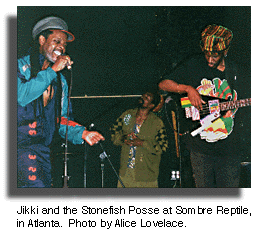|
America's True Reggae Rebel
Jikki & the Stonefish Posse by Alice Lovelace Atlanta, Georgia
The rebel roots of reggae had a lot to do with the cultural development of the music and it's universal appeal. Jikki's life personifies that of the righteous rebel; seeking peace, love and unity... but never turning his back on suffering and oppression. Jikki is well known in Atlanta for his commitment to community-based projects. His social activism has earned him accolades from the City of Atlanta and Fulton County in the form of resolutions saluting his social conscious work and contributions to the cultural life of the state. Since the mid-seventies Jikki has delighted Atlanta's poetry audiences with his Jazzoetry, using his voice like a be-bop instrument of political clarity and passion. His success as a poet also proved to be his strength as a songwriter and performer. In 1986, he was one of the founders of One Drop Plus, a band which clearly established a fertile foundation for reggae in Atlanta. As O.D.P.'s lead singer, songwriter and percussionist, Jikki led the band on stage to seven years at the top of the regional band scene. l recently caught up with Jikki and the Posse while they were rehearsing. I was especially interested in the spiritual growth and political progression I saw in this new band. The following is an excerpt from my conversation with Jikki. Q: Not many people in this country understand what "Rastafarian " means. Most people refer to the unwashed and unkept people they meet on the streets and want to know is this a representation of Rasta living. Jikki: That's true, there is a great confusion in this country and around "Rasta" thinking and living. I can only answer for I personally. For me, Rasta thinking starts with knowing that Haile Selassie I is, was, and will always be, God Jah Rastafari, King of Kings, Lord of Lords, Conquering Lion of the Tribe of Judea. Once I knew this my life changed as a black man in North America. Now I overstand the need for land and the need for family love. Now I can see and love my fellow sistren and brethren in a better light. No one has to prove anything to anyone. We don't sweat each other's belongings when we share each other's respect, then reach out to the extended family. Another way to check 'bout the living thing' is to come join the Stonefish Posse at our shows and posse up with us. We try to live by the tradition which is the religion, which is the music. One God, One Love, One Destiny. Our music is us, is now. Q: Why not spirituals or rhythm and blues, why not rock? Jikki: Well I think reggae music is all of that and more. Add to the mix, Caribbean and East African Nyabingi drums. The songs I write reflect this fusion of nationalist/urban realities. Concrete jungles are destroying the lives of many good people. Jikki and the Stonefish Posse gives voice within the cultural music known as Reggae to deal with these issues along with love songs and spirituals. In a word, Jikki and the Stonefish Posse is about toots music and land consciousness; served up with love, peace and a healthy dose of fun. |
|
Re-published in In Motion Magazine May 15, 1996 |
If you have any thoughts on this or would like to contribute to an ongoing discussion in the  What is New? || Affirmative Action || Art Changes || Autonomy: Chiapas - California || Community Images || Education Rights || E-mail, Opinions and Discussion || En español || Essays from Ireland || Global Eyes || Healthcare || Human Rights/Civil Rights || Piri Thomas || Photo of the Week || QA: Interviews || Region || Rural America || Search || Donate || To be notified of new articles || Survey || In Motion Magazine's Store || In Motion Magazine Staff || In Unity Book of Photos || Links Around The World NPC Productions Copyright © 1995-2020 NPC Productions as a compilation. All Rights Reserved. |


 In March 1994, Jikki and the Stonefish Posse took to the stage at the Masquerade in Atlanta, opening for the immortal Burning Spear. Jikki (a.k.a. Charles Riley) describes the band as "an Original American Reggae Band, a gathering of culturally diverse musicians, songwriters, singers, and poets who combine musical fusion, showmanship and a sound that is definitely reggae, true to it's Rastafarian Roots, yet uniquely new."
In March 1994, Jikki and the Stonefish Posse took to the stage at the Masquerade in Atlanta, opening for the immortal Burning Spear. Jikki (a.k.a. Charles Riley) describes the band as "an Original American Reggae Band, a gathering of culturally diverse musicians, songwriters, singers, and poets who combine musical fusion, showmanship and a sound that is definitely reggae, true to it's Rastafarian Roots, yet uniquely new."